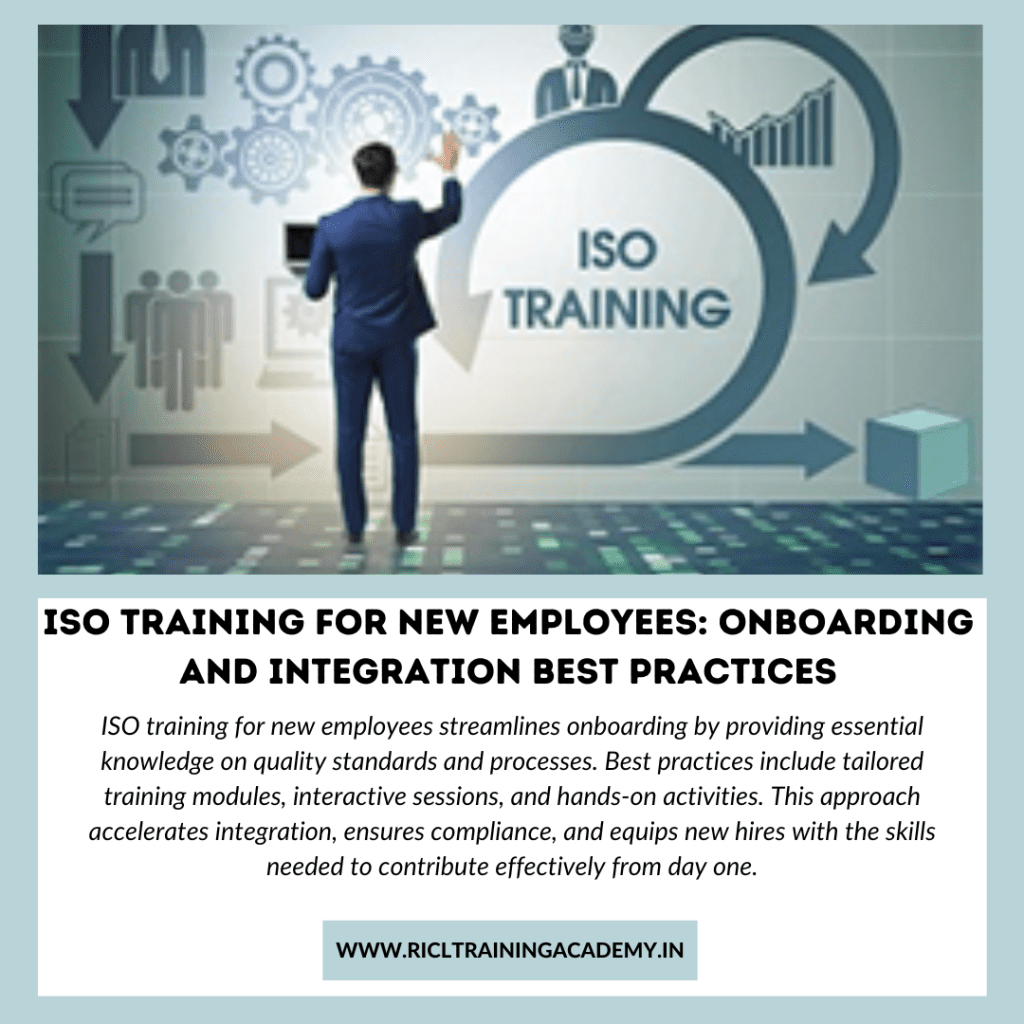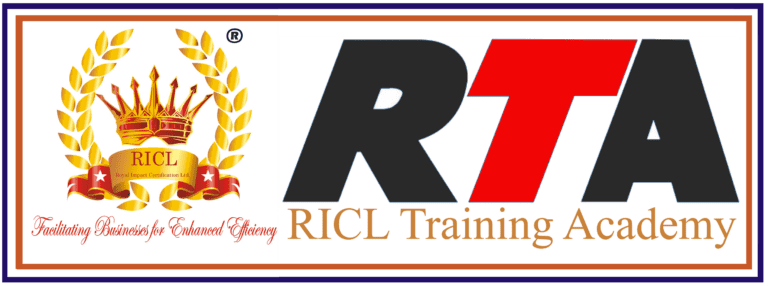ISO training is a critical component of onboarding and integrating new employees into an organization
ISO Training for New Employees: Onboarding and Integration Best Practices

ISO training is a critical component of onboarding and integrating new employees into an organization. Effective ISO training not only ensures that new hires understand and adhere to international standards but also fosters a culture of quality, compliance, and continuous improvement. Here’s a comprehensive guide to best practices for ISO training for new employees, focusing on onboarding and integration.
- Developing a Structured Training Program
A well-structured ISO training program is essential for effectively onboarding new employees. It should provide a clear pathway for learning about ISO standards and their application within the organization.
Best Practices:
- Training Plan: Develop a detailed training plan that outlines the objectives, content, and timeline of the ISO training program.
- Modular Approach: Break down the training into modules that cover different aspects of ISO standards, such as an overview of the standards, specific requirements, and practical applications.
- Integration with Onboarding: Integrate ISO training with the overall onboarding process to provide new employees with a comprehensive introduction to the organization’s quality management system.
- Providing an Overview of ISO Standards
New employees should receive a clear understanding of the ISO standards relevant to their role and the organization’s overall quality management system.
Best Practices:
- Standard Overview: Begin with a general overview of the ISO standards that the organization follows, explaining their purpose, benefits, and key requirements.
- Relevance to Role: Highlight how the ISO standards apply to the employee’s specific role and responsibilities.
- Organizational Context: Explain how ISO standards fit into the organization’s quality management system and overall business objectives.
- Offering Practical Training and Hands-On Experience
Practical training helps new employees understand how to apply ISO standards in real-world scenarios. Hands-on experience is crucial for reinforcing theoretical knowledge.
Best Practices:
- Interactive Workshops: Conduct workshops and simulations that allow employees to practice implementing ISO standards in a controlled environment.
- Role-Specific Training: Provide role-specific training that addresses the tasks and responsibilities associated with their position.
- Shadowing Opportunities: Offer opportunities for new employees to shadow experienced colleagues to observe the application of ISO standards in practice.
- Utilizing Various Training Methods
Employing a variety of training methods can enhance learning and engagement. Different methods cater to various learning styles and ensure that all aspects of ISO standards are covered effectively.
Best Practices:
- E-Learning: Use e-learning modules to provide flexible and accessible training on ISO standards.
- Classroom Training: Conduct in-person training sessions for interactive discussions and hands-on exercises.
- Training Manuals: Provide comprehensive training manuals and resources that employees can refer to during and after the training.
- Fostering Understanding Through Clear Communication
Effective communication is key to ensuring that new employees understand ISO standards and their importance. Clear communication helps prevent misunderstandings and ensures consistent implementation.
Best Practices:
- Plain Language: Use clear and straightforward language to explain ISO standards and their requirements.
- Visual Aids: Incorporate visual aids, such as diagrams and flowcharts, to illustrate complex concepts.
- Open Dialogue: Encourage open dialogue and questions to clarify any uncertainties and reinforce understanding.
- Incorporating Company Policies and Procedures
ISO training should be aligned with the organization’s specific policies and procedures. New employees need to understand how ISO standards are integrated into the company’s existing practices.
Best Practices:
- Policy Integration: Ensure that training includes an overview of company policies and procedures related to ISO standards.
- Procedure Documentation: Provide documentation that outlines how ISO standards are implemented within the organization, including processes and responsibilities.
- Compliance Expectations: Clearly communicate compliance expectations and the role of new employees in maintaining adherence to ISO standards.
- Monitoring and Evaluating Training Effectiveness
Assessing the effectiveness of ISO training is crucial for ensuring that new employees have acquired the necessary knowledge and skills. Monitoring and evaluation help identify areas for improvement and ensure continuous improvement in the training program.
Best Practices:
- Assessment Tools: Use quizzes, tests, and practical assessments to evaluate employees’ understanding of ISO standards.
- Feedback Mechanism: Collect feedback from new employees about their training experience and any challenges they encountered.
- Performance Metrics: Monitor performance metrics related to ISO compliance and quality management to assess the impact of the training.
- Providing Ongoing Support and Resources
ISO training is an ongoing process that extends beyond the initial onboarding phase. Providing continuous support and resources helps new employees stay updated and maintain their knowledge of ISO standards.
Best Practices:
- Refresher Courses: Offer refresher courses and periodic training updates to keep employees informed about any changes or updates to ISO standards.
- Support Channels: Establish support channels, such as help desks or mentoring programs, where employees can seek assistance and guidance.
- Knowledge Resources: Provide access to knowledge resources, such as online databases, manuals, and best practice guides.
- Creating a Culture of Quality and Compliance
ISO training should be part of a broader effort to build a culture of quality and compliance within the organization. Encouraging a commitment to ISO standards helps integrate them into everyday practices.
Best Practices:
- Leadership Engagement: Ensure that leadership demonstrates a commitment to ISO standards and quality management, setting an example for new employees.
- Recognition and Rewards: Recognize and reward employees who demonstrate excellence in implementing ISO standards and contributing to quality improvements.
- Continuous Improvement: Foster a culture of continuous improvement where employees are encouraged to contribute ideas and suggestions for enhancing processes and practices.
- Evaluating and Improving the Training Program
Regularly evaluate and improve the ISO training program to ensure its effectiveness and relevance. Continuous improvement in the training program helps address emerging needs and keeps the training aligned with industry best practices.
Best Practices:
- Regular Reviews: Conduct regular reviews of the training program to assess its effectiveness and identify areas for improvement.
- Incorporate Feedback: Use feedback from participants and performance data to make necessary adjustments to the training program.
- Stay Updated: Keep the training content updated with the latest changes to ISO standards and industry developments.
Conclusion
ISO training for new employees is a critical component of successful onboarding and integration. By developing a structured training program, providing practical experience, utilizing various training methods, and fostering clear communication, organizations can effectively prepare new hires to adhere to ISO standards. Ongoing support, a commitment to quality, and continuous improvement further enhance the effectiveness of ISO training, contributing to a culture of excellence and compliance. Investing in comprehensive and tailored ISO training ensures that new employees are well-equipped to contribute to the organization’s success and uphold its commitment to international standards.
Lead Auditor & Internal Auditor Training: QMS, EMS, OHSMS + Awareness Courses
Refine your know-how in Quality Management Systems by taking our all-inclusive Lead Auditor QMS training course. We equip you with skills necessary for effective auditing as well as ensuring conformance with ISO standards. It is an excellent resource for people who want to become professionals in QMS auditing through detailed knowledge and practical information.”
Become a certified Lead Auditor in Environmental Management Systems with our specialized training course. This program offers necessary know-how and skills for conducting effective inspections while also promoting environmental compliance according to ISO regulations. The perfect opportunity for those looking to progress their career further into the realm of environmental management”
Pursue your career growth using our Lead Auditor OHSMS training course, which is tailored towards equipping you with the skills needed to undertake comprehensive evaluations of Occupational Health and Safety Management Systems. Obtain practical capabilities as well as experience that guarantee individual workplaces’ security conformity with the most recent ISO requirements”.
Our Internal Auditor QMS training can help you improve your auditing skills. This course covers the principles and practices necessary for conducting internal audits of Quality Management Systems. Ideal for professionals looking to increase their understanding of QMS and contribute to organizational excellence.
Our Internal Auditor EMS course will help you enhance your skills in environmental auditing. Learn techniques and standards needed to implement efficient internal audits of environmental management systems, ensuring ISO compliance and its environmental sustainability.
The purpose of our Internal Auditor OHSMS training is to equip you with the necessary skills to conduct effective internal audits. This course gives an extensive overview on how to audit Occupational Health & Safety Management Systems so that you can achieve compliance and create a safe workplace.
Hone your understanding of Quality Management Systems (QMS) through our Awareness Auditor QMS. These courses provide a basic understanding of the principles, benefits and implementation strategies of QMS making them instrumental for improving quality management practices by individuals or teams.
Familiarize yourself with essential knowledge regarding the Environmental Management Systems by exploring our Awareness Auditor EMS. The courses offer an overview of the principles of EMS which will help you comprehend environmental policies and procedures along with their importance in achieving sustainability targets.
Out training programs on Occupational Health and Safety Management Systems are meant to improve your awareness in this field. This course is intended for organizations and individuals, they provide essential information on OHSMS principles and practices that lead to safer and compliant work environments.
Other Blogs
- Adaptability Thrive in a Dynamic World
- Artistic Sense Elevate Expression & Drive Innovation
- Body Language A Key Form of Non-Verbal Communication
- Business Ethics: Upholding Integrity and Sustainability
- Business Etiquette Cultivating Professionalism and Success
- Business Trend Awareness Stay Ahead & Drive Success
- Collaboration Foster Synergy for Collective Success
- Competitiveness Driving Excellence & Superior Performance
- Conflict Resolution Navigate Tensions for Positive Results
- Crisis Management Strategic Response & Communication
- Critical Thinking Empower Strategic Decisions
- Customer Service Excellence: Fostering Relationships and Driving Success
- Customizing ISO Training for Different Industry Needs: A Tailored Approach
- Dealing with Difficult People Constructive Interaction Tips
- Decision Making: Strategies for Complex Environments
- Delegation Strategic Empowerment for Success
- Design Sense Inspire Creativity & Spark Innovation
- Diplomacy Navigate Relationships & Achieve Goals
- Disability Awareness Embracing Inclusion and Empowerment
- Dispute Resolution Foster Collaboration & Harmony
- Diversity Awareness Fostering Inclusion and Collaboration
- Empathy Enhance Understanding & Build Stronger Connections
- Entrepreneurial Thinking Cultivating Innovation and Initiative
- Facilitation Enhance Group Dynamics Effectively
- Feeling Stagnant in Your Career? Start Here
- Giving Feedback Bridging Performance Gaps Effectively
- Humor A Universal Aspect of Human Experience
- Inspiring Cultivate Authentic Leadership
- Interviewing Skills Effective Communication in Recruitment
- ISO 14001 Lead Auditor Courses PDF Download
- ISO 14001 Lead Auditor Courses Study Material
- ISO 14001: Environmental Management Training Essentials
- ISO 22301 Internal Auditor Courses Material Download
- ISO 22301 Lead Auditor Courses Fees
- ISO 22301 Lead Auditor Courses Material Download
- ISO 22301 Lead Auditor Courses PDF Download
- ISO 30000 Internal Auditor Courses Material Download
- ISO 37001 Lead Auditor Courses PDF Download
- ISO 37001 Lead Auditor Courses Study Material
- ISO 41001 Internal Auditor Courses Material Download
- ISO 41001 Lead Auditor Courses Material Download
- ISO 41001 Lead Auditor Courses PDF Download
- ISO 41001 Lead Auditor Courses Study Material
- ISO 45001 Internal Auditor Courses Material Download
- ISO 45001 Lead Auditor Courses Fees
- ISO 45001 Lead Auditor Courses Material Download
- ISO 45001 Lead Auditor Courses PDF Download
- ISO 45001 Lead Auditor Courses Study Material
- ISO 50001 Internal Auditor Courses Material Download
- ISO 50001 Lead Auditor Courses Fees
- ISO 50001 Lead Auditor Courses Material Download
- ISO 50001 Lead Auditor Courses PDF Download
- ISO 50001 Lead Auditor Courses Study Material
- ISO 50001 Energy Management Training for Sustainability
- ISO 9001 Certification A Comprehensive Training Guide
- ISO 9001 Internal Auditor Courses Material Download
- ISO 9001 Lead Auditor Certificate Course
- ISO 9001 Lead Auditor Certification in India
- ISO 9001 Lead Auditor Courses Benefits
- ISO 9001 Lead Auditor Courses Cost
- ISO 9001 Lead Auditor Courses Exam Question and Answers
- ISO 9001 Lead Auditor Courses Fees
- ISO 9001 Lead Auditor Courses Fees
- ISO 9001 Lead Auditor Courses Fees in Chennai,Noida,Delhi
- ISO 9001 Lead Auditor Courses PDF Download
- ISO 9001 Lead Auditor Courses Study Material
- ISO Certification in Delhi NCR
- ISO Certification in India
- ISO Certification in Noida
- ISO Full Form
- ISO Lead Auditor Training Near Noida
- ISO Training for New Employees: Onboarding and Integration Best Practices
- Latest ISO Training Courses & Certificates
- Lead Auditor Certification
- Lead Auditor Course
- Lead Auditor ISO 14001 Course
- Lead Auditor ISO 22000 Course
- Lead Auditor ISO 45001 Course
- Lead Auditor ISO 9001 Course
- Lead Auditor Online Courses
- Lead Auditor Salary
- Lead Auditor Training
- Lead Auditor Training Provider in Delhi
- Lead Auditor Training Provider in India
- Lead Auditor Training Provider in Noida
- Listening The Cornerstone of Effective Communication
- Adaptability Thrive in a Dynamic World
- Artistic Sense Elevate Expression & Drive Innovation
- Body Language A Key Form of Non-Verbal Communication
- Business Ethics: Upholding Integrity and Sustainability
- Business Etiquette Cultivating Professionalism and Success
- Business Trend Awareness Stay Ahead & Drive Success
- Collaboration Foster Synergy for Collective Success
- Competitiveness Driving Excellence & Superior Performance
- Conflict Resolution Navigate Tensions for Positive Results
- Crisis Management Strategic Response & Communication
- Critical Thinking Empower Strategic Decisions
- Customer Service Excellence: Fostering Relationships and Driving Success
- Customizing ISO Training for Different Industry Needs: A Tailored Approach
- Dealing with Difficult People Constructive Interaction Tips
- Decision Making: Strategies for Complex Environments
- Delegation Strategic Empowerment for Success
- Design Sense Inspire Creativity & Spark Innovation
- Diplomacy Navigate Relationships & Achieve Goals
- Disability Awareness Embracing Inclusion and Empowerment
- Dispute Resolution Foster Collaboration & Harmony
- Diversity Awareness Fostering Inclusion and Collaboration
- Empathy Enhance Understanding & Build Stronger Connections
- Entrepreneurial Thinking Cultivating Innovation and Initiative
- Facilitation Enhance Group Dynamics Effectively
- Feeling Stagnant in Your Career? Start Here
- Giving Feedback Bridging Performance Gaps Effectively
- Humor A Universal Aspect of Human Experience
- Inspiring Cultivate Authentic Leadership
- Interviewing Skills Effective Communication in Recruitment
- ISO 14001 Lead Auditor Courses PDF Download
- ISO 14001 Lead Auditor Courses Study Material
- ISO 14001: Environmental Management Training Essentials
- ISO 22301 Internal Auditor Courses Material Download
- ISO 22301 Lead Auditor Courses Fees
- ISO 22301 Lead Auditor Courses Material Download
- ISO 22301 Lead Auditor Courses PDF Download
- ISO 30000 Internal Auditor Courses Material Download
- ISO 37001 Lead Auditor Courses PDF Download
- ISO 37001 Lead Auditor Courses Study Material
- ISO 41001 Internal Auditor Courses Material Download
- ISO 41001 Lead Auditor Courses Material Download
- ISO 41001 Lead Auditor Courses PDF Download
- ISO 41001 Lead Auditor Courses Study Material
- ISO 45001 Internal Auditor Courses Material Download
- ISO 45001 Lead Auditor Courses Fees
- ISO 45001 Lead Auditor Courses Material Download
- ISO 45001 Lead Auditor Courses PDF Download
- ISO 45001 Lead Auditor Courses Study Material
- ISO 50001 Internal Auditor Courses Material Download
- ISO 50001 Lead Auditor Courses Fees
- ISO 50001 Lead Auditor Courses Material Download
- ISO 50001 Lead Auditor Courses PDF Download
- ISO 50001 Lead Auditor Courses Study Material
- ISO 50001 Energy Management Training for Sustainability
- ISO 9001 Certification A Comprehensive Training Guide
- ISO 9001 Internal Auditor Courses Material Download
- ISO 9001 Lead Auditor Certificate Course
- ISO 9001 Lead Auditor Certification in India
- ISO 9001 Lead Auditor Courses Benefits
- ISO 9001 Lead Auditor Courses Cost
- ISO 9001 Lead Auditor Courses Exam Question and Answers
- ISO 9001 Lead Auditor Courses Fees
- ISO 9001 Lead Auditor Courses Fees
- ISO 9001 Lead Auditor Courses Fees in Chennai,Noida,Delhi
- ISO 9001 Lead Auditor Courses PDF Download
- ISO 9001 Lead Auditor Courses Study Material
- ISO Certification in Delhi NCR
- ISO Certification in India
- ISO Certification in Noida
- ISO Full Form
- ISO Lead Auditor Training Near Noida
- ISO Training for New Employees: Onboarding and Integration Best Practices
- Latest ISO Training Courses & Certificates
- Lead Auditor Certification
- Lead Auditor Course
- Lead Auditor ISO 14001 Course
- Lead Auditor ISO 22000 Course
- Lead Auditor ISO 45001 Course
- Lead Auditor ISO 9001 Course
- Lead Auditor Online Courses
- Lead Auditor Salary
- Lead Auditor Training
- Lead Auditor Training Provider in Delhi
- Lead Auditor Training Provider in India
- Lead Auditor Training Provider in Noida
- Listening The Cornerstone of Effective Communication

TESTIMONIALS
What Our Cutomers are Saying About us

Ruis aute irure dolor in reprehender voluptate velit esse cillum dolore fugiat pariatur sint occaecat cupidata non proie sunt in culpa aui officede









Reach us at:
info@ricltrainingacademy.in
support@ricltrainingacademy.in
sales@ricltrainingacademy.in
complaint@ricltrainingacademy.in
Call us at:
9355650992
9355650993
Visit us at:
Royal Impact Certification Limited
623 Tower -B, The Ithum Sector – 62, Noida, 201301.
Copyright © 2024 RICL Training Academy Team


